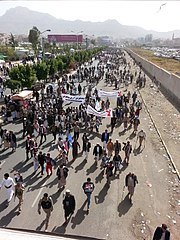Adressing the crisis in Yemen
Since 2004 Yemen has been the stage of a gruesome civil war, that has led to countless humanitarian desaters.
In order to end this deadlocked conflict and establish a long lasting solution in the region delegates are faced with the task of finding a way to, not only guarantee security and safety, but also to establish peace and stability in a region, that has been shaken by conflict for years.

the chairs of the SC

Dear delegates,
It is my pleasure to introduce you to this year’s Security Council of the 2020 3MUN conference. This year’s SC will tackle the topic of “addressing the crisis in Yemen”, a topic that has been of importance since quite a while and continuously grows in importance. As the president of the SC and the assistent deputy secretary General of this conference I have great confidence in our delegates and their ability to find an adequate solution to this pressing crisis.
On a personal note I am a 16-year-old student at the Dreilinden-Gymnasium. I have participated in MUN conferences for about two years now and this is my second time chairing. My hobbies include swimming and reading.
sincerely
Kaya Herz
Chair of the SC
Assistent Deputy Secretary General

Honorable Delegates of the Historical Security Council,
I am honored to welcome you to the 2020 3-MUN Historical Security Council. This is my second year as a member of the MUN program, making 3-MUN my 10th conference. This being my second chairing experience, I aim for a productive and lively debate.
Currently, I am 16 years old and entering the 12th grade at the Nelson-Mandela-School in Berlin. MUN has widened my understating of foreign relations, critical thinking and public speaking. When I am not busying myself with MUN, I practice martial arts and enjoy reading.
Abdo Rabbu Mansour Hadi, the president of Yemen was forced out of the country by Houthi rebels in March 2015. The Houthi rebels were supported by elements of Yemen’s military who are loyal to the country’s former president, Ali Abdullah Saleh. A coalition, to restore Yemen’s internationally recognised government to power, was formed by Saudi Arabia as a response. The coalition included the Gulf Cooperation Council states (with the exception of Oman), Egypt, and Sudan, and was backed by the United States and United Kingdom. Amid ongoing fighting, conditions in Yemen continue to worsen. Even the Areas under the control of the internationally recognised government show political instability.
The unrest in Yemen is not a single conflict, instead a layered conflict of multifaceted regional, local, and international power struggles. SC delegates will have to work together to find long-term solutions to stabilize Yemen politically and prevent massive escalization.
I look forward to effective and diplomatic debate from all SC participants,
Sincerely,
Emily Rose Reid
Chair of the SC
The research reports will be provided here, when available